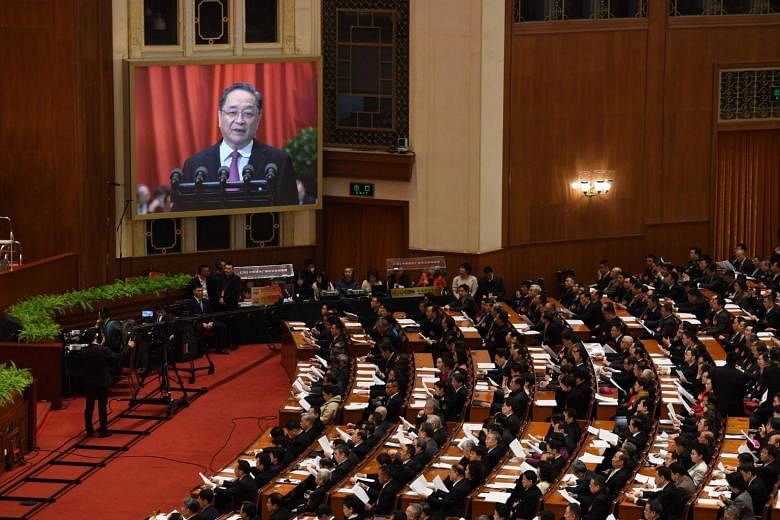China's top advisory body will work towards weeding out corruption in the relationship between business and government, and fight poverty with renewed emphasis.
China's fourth-ranked leader, Mr Yu Zhengsheng, said 2017 will see Beijing intensify efforts to promote supply-side structural reform in much-needed areas such as its agricultural sector, while keeping a closer eye on its real-estate market.
Mr Yu chairs the Chinese People's Political Consultative Conference (CPPCC).
Outlining this year's work as the CPPCC opened its annual session in Beijing yesterday, Mr Yu said it was important that government and business develop a new relationship that is congenial yet graft-free. "We want to promote the healthy development of the private sector," he said.
CPPCC spokesman Wang Guoqing said on Thursday that seven provinces have already put in place rules that set the boundaries for relationships between officials and executives.
Besides stating clearly what behaviour is unacceptable, the new policy directs officials to be more proactive in reaching out to the business community.
"Increasingly, entrepreneurs will have the belief that success in business comes from innovation and good management, not guanxi," said Mr Wang, using the Chinese term for connections.
A key plank of the CPPCC's work this year will focus on helping meet the government's target of lifting 10 million people out of poverty.
China has made achieving this goal a top priority, as it will give confidence to its even more ambitious target of lifting all 70 million Chinese currently living below its poverty line by 2020, just before the centennial anniversary of the founding of the Chinese Communist Party.
Mr Yu said the CPPCC will closely monitor the progress of major uplift projects such as a pairing programme that has matched 10,000 businesses with 10,000 villages, the development of local industries, and the creation of more job opportunities in the less well-off regions.
It also plans to convene a special meeting of its apex standing committee to discuss problems with implementing targeted poverty alleviation initiatives and to offer suggestions.
"We will conduct research and provide suggestions on revitalising the real economy and promoting its transformation and upgrading, promote supply-side structural reform in the agricultural sector, improve systems for regulating the real-estate market, and strengthen oversight of e-commerce," said Mr Yu.
China's push to rethink its relationship with business and to help its businesses grow drew kudos from many of the 2,000 delegates, who include business tycoons, in the Great Hall of the People.
Speaking to reporters after the opening meetings, CPPCC delegate Jia Kang told reporters that measures such as state-owned enterprise reform and cuts in business taxes are a step in the right direction, but much more needs to be done.
"For instance, just reducing taxes is not enough when there are so many other costs that pile up for businesses, such as materials cost, logistics cost and electricity costs," said Mr Jia.
The president of the China Academy of New Supply-side Economics added: "Lowering business costs is not so simple, and we cannot assume that what works for other countries will work for China."

